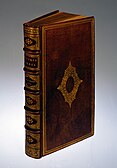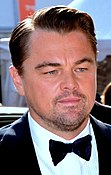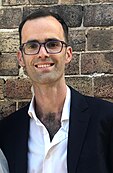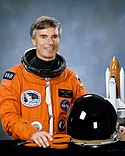| << | Today's featured articles for November 2023 | >> | ||||
|---|---|---|---|---|---|---|
| Su | Mo | Tu | We | Th | Fr | Sa |
| 1 | 2 | 3 | 4 | |||
| 5 | 6 | 7 | 8 | 9 | 10 | 11 |
| 12 | 13 | 14 | 15 | 16 | 17 | 18 |
| 19 | 20 | 21 | 22 | 23 | 24 | 25 |
| 26 | 27 | 28 | 29 | 30 | ||
November 1
Asimov's Science Fiction is an American science fiction magazine edited by Sheila Williams (pictured) since 2004. It was launched in 1976 under the title Isaac Asimov's Science Fiction Magazine, and was quickly successful, reaching a circulation of over 100,000 within a year. George H. Scithers, the first editor, published many new writers who went on to be successful in the genre. Shawna McCarthy became the editor in 1983, and expanded the range of stories Asimov's was willing to publish. Stories involving sex or violence scandalized some readers, but Isaac Asimov, the editorial director, defended McCarthy's choices in an editorial. McCarthy transformed the magazine into a leading market for science fiction writers, and more award-winning stories appeared, including fiction by Robert Silverberg and John Varley. Gardner Dozois took over as editor in 1985 and multiple award-winning stories appeared during his tenure. Asimov's was acquired by Dell Magazines in 1992, and by Penny Press in 1996. (Full article...)
November 2
The 44th Chess Olympiad was an international team chess event organised by the International Chess Federation (FIDE) in Chennai, India, in 2022. This was the first Chess Olympiad to take place in India. The main venue was the Four Points by Sheraton convention centre at Mahabalipuram. There were 937 participants in the open tournament and 800 in the women's event. Teams represented 186 nations in the open section and 160 in the women's. Both sections set team participation records. Uzbekistan won the gold medal in the open event, while Ukraine claimed gold in the women's event. English player David Howell had the highest performance for an individual player in the open event with a performance rating of 2898, scoring 7½ out of a possible 8 points. Polish player Oliwia Kiołbasa had the highest individual performance in the women's event with a performance rating of 2565, with 9½ out of a possible 11 points. The 93rd FIDE Congress took place during the Olympiad. (Full article...)
November 3
Murasaki Shikibu (c. 973 – c. 1014 or 1025) was a Japanese novelist, poet and lady-in-waiting at the Imperial court in the Heian period. She is best known as the author of The Tale of Genji, written in Japanese between about 1000 and 1012. She became a lady-in-waiting to Empress Shōshi at the Imperial court around 1005, and continued to write during her service, adding scenes from court life to her work, reflected in The Diary of Lady Murasaki. After several years, she left court and retired with Shōshi to the Lake Biwa region. Within a decade of its completion, Genji was distributed throughout the provinces; within a century it was recognized as a classic of Japanese literature and became the subject of scholarly criticism. The Tale of Genji was translated into English in the early 20th century; scholars continue to recognize the importance of her work, which reflects Heian court society at its peak. (Full article...)
November 4
Dark Archives is a book by the medical librarian and death-positive advocate Megan Rosenbloom. It focuses on anthropodermic bibliopegy, the binding of books in human skin (reported example pictured). In Dark Archives, Rosenbloom discusses such books and their historical, ethical, and cultural implications. She analyses how the practice's rise and fall reflects changing attitudes towards consent, ownership, and disposal of human bodies, and how its history intertwines with the history of medical ethics as a field. Rosenbloom examines notable books bound in human skin and their origins, and interviews librarians, archivists, collectors, and experts on the topic. Though Rosenbloom supports the preservation and maintenance of anthropodermic books, Dark Archives also covers arguments to the contrary. The book was published by Farrar, Straus and Giroux in 2020; critics praised it for its thorough research, clear writing, and enthusiasm for rare books and their history. (Full article...)
November 5

Logic is the study of correct reasoning. Formal logic aims to determine the correctness of arguments based on their structure alone and often uses a formal language to analyze them. Informal logic examines arguments expressed in natural language and also takes their content and context into account. Logic distinguishes between deductive, inductive, and abductive arguments. Deductive arguments have the strongest form of support: if their premises are true then their conclusion must also be true, such as in the argument "today is Sunday; if today is Sunday then I do not have to work today; therefore I do not have to work today". Inductive arguments are generalizations, like inferring that all ravens are black based on many individual observations. Abductive arguments are inferences to the best explanation, for instance, when a doctor concludes that a patient has a certain disease that explains the symptoms they suffer. Arguments that fall short of the standards of reasoning embody fallacies. (Full article...)
November 6

The Rodrigues night heron is an extinct species of heron that was endemic to the Mascarene island of Rodrigues. It was first mentioned in two accounts, from around 1692 and around 1725, which were correlated with subfossil remains found and described in the latter part of the 19th century. The Rodrigues night heron was robust, its bill was large, stout, and straight, and its legs were short and strong. It is estimated to have been 60 cm (24 in) long, and its appearance in life is uncertain. Little is known about its behaviour, but the contemporary accounts indicate that it ate lizards, was adapted to running, and was able to fly but rarely did so. Examinations of the known remains have confirmed its terrestrial adaptations; one researcher thought the species flightless but this idea has not been accepted by others. The species could not be found by 1763, and it is thought to have been driven to extinction by human-related factors such as the introduction of cats. (Full article...)
November 7

The 1899 Kentucky gubernatorial election was held on November 7, 1899. The Republican incumbent, William Bradley, was term-limited. The Democrats chose William Goebel. Republicans nominated William Taylor. Taylor won by a vote of 193,714 to 191,331. The vote was challenged on grounds of voter fraud, but the Board of Elections, though stocked with pro-Goebel members, certified the result. Democratic legislators began investigations, but before their committee could report, Goebel was shot by an unknown assassin (event pictured) on January 30, 1900. Democrats voided enough votes to swing the election to Goebel, Taylor was deposed, and Goebel was sworn into office on January 31. He died on February 3. The lieutenant governor of Kentucky, J. C. W. Beckham, became governor, and battled Taylor in court. Beckham won on appeal, and Taylor fled to Indiana, fearing arrest as an accomplice. The only persons convicted in connection with the killing were later pardoned; the assassin's identity remains a mystery. (Full article...)
November 8
"Smoking on My Ex Pack" is a song by American singer-songwriter SZA (pictured) from her second studio album, SOS (2022). It is one of the album's three rap tracks, built around hard-hitting drums and a sped-up sample of a 1980s ballad. Before the album's release, SZA was viewed as an R&B artist who made melancholic music aimed at a female audience, or "sad girl music". Disillusioned, she conceived "Smoking on My Ex Pack", among other songs, to combat such narratives, which she believed was stereotyping of her as a Black woman. With the track, she experimented with more lyrically and sonically aggressive music, making a foray into hip hop. "Smoking on My Ex Pack" speaks positively of her own sex appeal and negatively of her ex-lovers, reveling in SZA's braggadocious, taunting persona: one lover has his penis ridiculed. Critics were positive about the new sound, and they deemed the lyrics candid and scathing enough that she had the potential to become a fully fledged rapper. (Full article...)
November 9
Hove War Memorial is a First World War memorial designed by Sir Edwin Lutyens and located on Grand Avenue in Hove, part of the city of Brighton and Hove, on the south coast of England. Hove was the site of one of the earliest recruiting events at the beginning of the war and later of several military hospitals. Over 600 men from the town were killed during the war. A war memorial committee was established in 1919 and Lutyens was engaged as architect. He designed a Tuscan column on a three-staged base, topped with a statue of Saint George, patron saint of England. George, cast in the studio of Sir George Frampton, holds a sword by the blade in one hand and a shield in the other. The same statue, with variations, appears on several other monuments. The base contains several dedicatory inscriptions but no names, which are instead recorded on plaques in the town's library. The memorial was unveiled on 27 February 1921 by Lord Leconfield. It is a Grade II listed building. (Full article...)
November 10
Radoje Pajović (1934–2019) was a prominent Yugoslav and Montenegrin historian who worked at the Institute of History at the University of Montenegro for forty years, and received the "13 July Award" from the National Assembly of Montenegro and the "19 December Award" from the city of Titograd for his academic contributions. His most notable works focussed on the Chetnik movement in World War II, and particularly the Chetnik leader Pavle Đurišić. He was the author or co-author of twelve books and the editor of more than twenty, and published around one hundred articles and other contributions. In the 1990s, some historians attempted to rehabilitate the World War II Chetniks who collaborated with the Axis powers such as Đurišić and Draža Mihailović, and Pajović was among the historians who opposed this politically motivated historical revisionism. Towards the end of his academic career and in retirement, Pajović was a vocal advocate for Montenegrin independence and identity. (Full article...)
November 11
Leonardo DiCaprio (born November 11, 1974) is an American actor and film producer. He is the recipient of numerous accolades, including an Academy Award and three Golden Globe Awards. His films have grossed over $7.2 billion worldwide, and he was among the world's highest-paid actors for eight years. DiCaprio was voted one of the 50 greatest actors of all time in a 2022 readers' poll by Empire. He began his career in the late 1980s by appearing in television commercials and achieved international stardom with the blockbuster film Titanic (1997). Among his most successful films are Blood Diamond (2006), Inception (2010), Django Unchained (2012), The Revenant (2015) and Once Upon a Time in Hollywood (2019), as well as his many collaborations with director Martin Scorsese, including The Aviator (2004), The Departed (2006) and The Wolf of Wall Street (2013). Beyond film, he regularly promotes environmental causes. (This article is part of a featured topic: Overview of Leonardo DiCaprio.)
November 12
Tunic is a 2022 action-adventure game developed by Isometricorp Games and published by Finji. It is set in a ruined fantasy world, where the player controls an anthropomorphic fox on a journey to free a fox spirit trapped in a crystal. The player discovers the gameplay and setting by exploring and finding in-game pages of a manual that offers clues, drawings, and notes. The backstory is obscured in a constructed writing system, and there are numerous hidden pathways. Designer Andrew Shouldice developed Tunic, his first major game, over seven years. The game was released for macOS, Windows, the Xbox One, and the Xbox Series X/S in March 2022, followed by ports for the Nintendo Switch, the PlayStation 4, and the PlayStation 5 in September. It received positive reviews, especially for its aesthetics, design, and gameplay, but drew some criticism for uneven difficulty and the potential for players to feel stuck. Tunic won the Outstanding Achievement for an Independent Game award at the 26th Annual D.I.C.E. Awards. (Full article...)
November 13
Fuzuli (Füzuli) is the pen name of Muhammad bin Suleyman (1483–1556), a 16th-century poet who composed works in his native Azerbaijani, as well as Persian and Arabic. He is regarded as one of the greatest poets of Turkic literature. He was widely admired from the 16th to the 19th centuries, including in Central Asia and India. Born in modern Iraq, Fuzuli saw his homeland change hands between the Aq Qoyunlu, Safavid, and Ottoman states, and he composed poetry for officials in all three empires. He wrote his first known poem to Alvand Mirza of the Aq Qoyunlu, but most of his poetry was written under Ottoman rule. Fuzuli died from the plague and was buried in Karbala. He is best known for his Azerbaijani works, especially his ghazals (love poems) and his Leylī va Macnūn, a lyric poem interpreting a Middle Eastern story of tragic love. Fuzuli's writings have been described as distinguished by his strong display of emotions, and as elevating Azerbaijani poetry and language to new heights. (Full article...)
November 14
Sedna is a trans-Neptunian object with the minor-planet number 90377. It was discovered on November 14, 2003, by the astronomers Michael Brown, Chad Trujillo, and David Rabinowitz. As of 2023, Sedna is 84 astronomical units (AU) from the Sun, which is almost three times the distance between Neptune and the Sun. Sedna's orbit is an ellipse and its aphelion is approximately 937 AU (140 billion km). For most of its orbital period, Sedna is farther from the Sun than any known dwarf planet candidate of its size. Sedna is one of the reddest objects in the Solar System. It is mostly composed of frozen water, methane, and nitrogen with tholins. It may have formed within the same open cluster where the Sun was born as some astronomers suggest that Sedna is a celestial body captured by the Sun from another star system. Brown considers Sedna to be the most important trans-Neptunian object ever discovered, because its unusual orbit may yield information about the origin and early evolution of the Solar System. (Full article...)
November 15
Jessie Murray (1867–1920) was a British psychoanalyst and suffragette who studied medicine at the University of Durham and University College London. Murray and her close friend Julia Turner opened the Medico-Psychological Clinic (site pictured) in 1913, a pioneering entity that provided psychological evaluation and treatment that was affordable for middle-class families. Several of the staff who worked and trained at the clinic became leading psychoanalysts. The clinic closed in 1922, although it laid the foundation of psychological evaluation in the UK. Murray was a member of the Women's Freedom League and the Women's Tax Resistance League, two organisations that took direct action for women's suffrage. In 1910 she and the journalist Henry Brailsford took statements from the suffragettes who had been mistreated during the Black Friday demonstrations. Their memorandum was published, with a formal request for a public inquiry. The home secretary, Winston Churchill, refused to establish one. (Full article...)
November 16

In Tennessee, Interstate 40 (I-40) runs from west to east, from the Mississippi River at the Arkansas border to the Blue Ridge Mountains at the North Carolina state line. Paralleling the older U.S. Route 70 corridor, I-40 passes through Tennessee's three largest cities—Memphis, Nashville, and Knoxville—and serves the Great Smoky Mountains National Park, the most-visited national park in the United States. At 455.28 miles (732.70 km), the Tennessee segment of I-40 is the longest of those in the eight states through which the highway passes and the state's longest Interstate Highway. Built in segments, I-40 in Tennessee was mostly complete by the late 1960s. The construction of the highway resulted in the U.S. Supreme Court decision Citizens to Preserve Overton Park v. Volpe (1971), increasing the scope for judicial review of administrative actions. The case caused the state to realign I-40's route through Memphis onto what was originally a section of I-240. (Full article...)
November 17
Australiformis is a monotypic genus of acanthocephalans (thorny-headed or spiny-headed parasitic worms) that infest marsupials in Australia and New Guinea. The worm's body consists of a long trunk and a proboscis armed with hooks, which it uses to pierce and hold the gut wall of its host. The only species in the genus, Australiformis semoni, resembles species in the genus Moniliformis but lacks spiral muscles in the outer wall of the proboscis receptacle. The proboscis is armed with 12 rows of 13 to 15 hooks which are used to attach themselves to the small or large intestine of the host. The female worms range from 95 to 197 mm long, virtually all of which is the trunk, and 1.75 to 3.5 mm wide. There is pronounced sexual dimorphism in this species as females are around twice the size of the males, whose trunks range from 46 to 80 mm long and are about 2 mm wide. Infestation of marsupials by A. semoni may cause debilitating inflammation of the stomach (gastritis) with granulomatous ulcers. (Full article...)
November 18
Alan Shepard (November 18, 1923 – July 21, 1998) was an American astronaut, naval aviator, test pilot, and businessman. In 1961 he became the second person and the first American to travel into space, and in 1971 he walked on the Moon (pictured). Shepard saw action with the surface navy during World War II. He became a naval aviator in 1947, and a test pilot in 1951. He was one of NASA's original Mercury Seven astronauts in 1959, and in May 1961 he made his first spaceflight: Mercury-Redstone 3, the first crewed Project Mercury flight. In 1971, he commanded the Apollo 14 mission, piloting the Apollo Lunar Module Antares. He became the fifth and the oldest person to walk on the Moon, and the only one of the Mercury Seven astronauts to do so. He was promoted to rear admiral in 1971, and was the first astronaut to reach that rank. He was Chief of the Astronaut Office from November 1963 to July 1969, and from June 1971 to April 1974. He retired from NASA and the United States Navy in July 1974. (Full article...)
November 19
"To Be Loved" is a song by English singer Adele (pictured) from her fourth studio album, 30 (2021). Adele wrote the song with Tobias Jesso Jr., who produced it with Shawn Everett. It was released by Columbia Records as the album's 11th track on 19 November 2021. A torch ballad, "To Be Loved" has piano instrumentation and sets Adele's echoey vocals over minimalistic production. The song is about the sacrifices one must make upon falling in love and addresses Adele's divorce from Simon Konecki, attempting to justify to her son why their marriage did not succeed. It received universal acclaim from music critics, who compared Adele's vocal performance to those of Whitney Houston and highlighted it as her all-time best. Several publications included "To Be Loved" in their lists of the best songs of 2021. The song reached the top 40 in Australia, Canada, Sweden, and the United States and entered the charts in some other countries. Adele vowed never to perform it live due to its emotional nature. (Full article...)
November 20
The Quine–Putnam indispensability argument reasons that we should believe in abstract mathematical objects such as numbers and sets because mathematics is indispensable to science. One of the most important ideas in the philosophy of mathematics, it is credited to W. V. Quine and Hilary Putnam (pictured). The roots of the argument can be traced back to thinkers such as Gottlob Frege and Kurt Gödel, but Quine introduced its key components, including naturalism and confirmational holism. Putnam gave Quine's argument its first detailed formulation, although he later expressed disagreement with some aspects of the argument. Many counterarguments have been raised against the idea. An influential argument by Hartry Field holds that mathematical entities are dispensable to science. Other philosophers, such as Penelope Maddy, have argued that we do not need to believe in all of the entities that are indispensable to science. (Full article...)
November 21
The sarcophagus of Eshmunazar II dates to the 6th century BC and was unearthed in 1855 near Sidon, in modern-day Lebanon. It contained the body of a Phoenician king of Sidon and is one of only three Ancient Egyptian sarcophagi found outside Egypt. It was likely carved in Egypt from local amphibolite and captured during Cambyses II's conquest of Egypt in 525 BC. The sarcophagus has two sets of Phoenician inscriptions, one on its lid and a partial copy of it around the curvature of the head. This was the first Phoenician language text to be discovered in Phoenicia proper and the most detailed found to that point. More than a dozen scholars rushed to translate it, noting the similarities between the Phoenician language and Hebrew. The translation allowed them to identify the king buried inside, his lineage, and his construction feats. The inscriptions also warn against disturbing Eshmunazar II's place of repose. Today the sarcophagus is a highlight of the Louvre's Phoenician collection. (Full article...)
November 22
The assassination of John F. Kennedy, the 35th U.S. president, occurred on November 22, 1963, while Kennedy was riding in a motorcade through Dealey Plaza in Dallas, Texas. He was shot from the Texas School Book Depository by Lee Harvey Oswald. Kennedy was pronounced dead at Parkland Memorial Hospital. Vice President Lyndon B. Johnson was sworn in as president later that day. Oswald was arrested and charged with murder. Two days later, he was shot dead by Jack Ruby on live television. The Warren Commission concluded that Oswald killed Kennedy, acting alone; most later federal investigations have agreed with its general findings. The event is still the subject of debate and conspiracy theories, which many Americans believe in. Kennedy's killing had a profound impact and was the first of four major assassinations during the 1960s in the U.S., including that of Kennedy's brother Robert in 1968. Kennedy was the fourth U.S. president to be assassinated and the most recent to have died in office. (Full article...)
November 23
Frozen II is an American animated musical fantasy film produced by Walt Disney Animation Studios and released in the U.S. on November 22, 2019, as the sequel to Frozen (2013). Directed by Chris Buck and Jennifer Lee, it stars the voices of Kristen Bell (pictured), Idina Menzel, Josh Gad, and Jonathan Groff. It follows sisters Anna (played by Bell) and Elsa (Menzel), and their companions, Kristoff and his reindeer Sven (both Groff) and Olaf (Gad), as they travel to an enchanted forest to unravel the origin of Elsa's magical power. The film's animation technology, involving an interdepartmental collaboration, was more complex than that in Frozen. Frozen II was translated into 46 languages and was accompanied by Into the Unknown: Making Frozen II, a documentary series. It was the third-highest-grossing film of 2019 worldwide, at $1.453 billion. Critics generally reviewed the film positively, and it was nominated for Best Original Song at the 92nd Academy Awards, among numerous other accolades. (Full article...)
November 24

Ormond Beatty (1815–1890) was an American educator and academic administrator who was the seventh president of Centre College in Danville, Kentucky. An 1835 graduate of Centre, Beatty became a professor soon after, following a year of studies at Yale University. He taught chemistry, natural philosophy, mathematics, metaphysics, biblical history, and church history over the course of his career. He was president pro tempore following the resignation of William L. Breckinridge in 1868 and was unanimously elected president by the board of trustees in 1870. He was Centre's first president who was not a Christian minister, and he led the school until his resignation in 1888. He taught for two additional years at the request of the board before his death. In religious affairs, he served as a ruling elder in the First and Second Presbyterian Churches in Danville, as a commissioner to three Presbyterian Church General Assemblies, and as a trustee of the Danville Theological Seminary. (Full article...)
November 25
Micronations and the Search for Sovereignty is a non-fiction book about micronations and their legal status within international law. It is written by the Australian lawyers and legal academics Harry Hobbs (pictured) and George Williams, both of whom specialise in international law. Written from an academic perspective, it is one of few works on micronational movements. The book concerns the definition of statehood, the place of micronations within international law, the motivations people have for declaring them, the micronational community, and the ways by which such entities mimic sovereign states. It was published by Cambridge University Press as an ebook on 23 December 2021, and in hardcover and paperback formats in January 2022. The work's legal and non-dismissive academic approach to micronations garnered positive reviews. Hobbs and Williams also authored How to Rule Your Own Country: The Weird and Wonderful World of Micronations for a broader audience, published later in 2022. (Full article...)
November 26
Angeline Quinto (born November 26, 1989) is a Filipino singer and actress. Her career began after winning the talent show Star Power in 2011. She signed with Star Music and collaborated with producer Jonathan Manalo to record material for her self-titled debut album. Its single "Patuloy ang Pangarap" helped Quinto rise to prominence, earning her an Aliw Award for Best New Artist and a Star Award for Song of the Year. She played the female lead in the romantic film Born to Love You (2012) and the comedy drama series Kahit Konting Pagtingin (2013), winning a Golden Screen Award for Breakthrough Performance by an Actress for the latter. She received further acclaim for collaborations with filmmaker Joel Lamangan in the ensemble comedy That Thing Called Tanga Na (2016) and the comedy drama Foolish Love (2017). Quinto's music is noted for its themes about heartbreak and empowerment, with her songs featured as soundtracks of numerous films and television series. (This article is part of a featured topic: Overview of Angeline Quinto.)
November 27
Art Deco architecture in New York City flourished during the 1920s and 1930s, and is found in governmental, residential, and commercial buildings, from towering skyscrapers to modest middle-class housing and municipal buildings, across all five boroughs. The style broke with traditional architectural conventions and was characterized by verticality, ornamentation, and new building materials. It was influenced by worldwide decorative arts trends, the rise of mechanization, and New York City's 1916 Zoning Resolution, which favored the setback feature in many buildings. The Great Depression and changing tastes pushed the style to more subdued applications as it spread in the 1930s, before falling out of fashion after World War II. Among New York's most recognizable skyscrapers are the Chrysler Building (pictured) and the Empire State Building, both Art Deco skyscrapers. Many of these buildings are protected by historic preservation laws, while others have been lost to new development or neglect. (Full article...)
November 28
Ulf Merbold (born 1941) is a German physicist and astronaut. After growing up in East Germany, he studied physics at the University of Stuttgart in West Germany. In 1977, he applied to become one of the first astronauts of the European Space Agency (ESA), and started astronaut training with NASA in 1978. On November 28, 1983, Merbold became the first West German in space and the first non-American to fly on a NASA spacecraft when he flew aboard Space Shuttle Columbia as a payload specialist of the STS-9 mission. He participated in two further space flights, the STS-42 NASA mission in 1992 and a Euromir mission to the Russian space station Mir in 1994. In total, he spent 49 days in space, where most of his work was related to performing experiments in materials science and the life sciences. Merbold also provided ground support for other ESA missions and served as head of the German Aerospace Center's astronaut office. He worked for ESA until his retirement in 2004. (Full article...)
November 29
Revolutionary Girl Utena is a 1997 Japanese anime television series created by Be-Papas, a production group formed by director Kunihiko Ikuhara. The series follows Utena Tenjou, a teenaged girl drawn into a sword dueling tournament to win the hand of a mysterious girl who possesses the "power to revolutionize the world". Ikuhara was a director on the television anime adaptation of Sailor Moon, and conceived Utena in response to a lack of creative control in directing an adapted work. Utena has been described as a deconstruction and subversion of fairy tales and the magical-girl genre, making use of avant-garde and surrealist elements to comment on themes of gender, sexuality, and coming of age. The series received domestic and international critical acclaim, particularly for its treatment of LGBT themes and subject material, and has influenced subsequent animated works. In 1999, Adolescence of Utena was released as a follow-up film to the series. (Full article...)
November 30

British logistics supported the Anglo-Canadian forces in the Western Allied invasion of Germany, the final campaign of the Second World War in Europe. By this time, the 21st Army Group was highly experienced, professional and proficient. Mechanisation and materiel were used to maximum effect to conserve manpower. The First Canadian Army was reunited by the return of divisions from Italy. The army roadheads were mainly supplied by rail; fuel was brought by tankers and the Operation Pluto pipeline. Thousands of guns and millions of rounds of ammunition were used in Operation Veritable, the advance to the Rhine; and Operation Plunder, the Rhine crossing, which also featured an airborne operation. Engineers soon had bridges in operation. During April 1945, the 21st Army Group advanced across northern Germany to reach the Elbe and then the Baltic Sea. On 4 May, Field Marshal Sir Bernard Montgomery took the surrender of the German forces in front of the 21st Army Group. (Full article...)






















